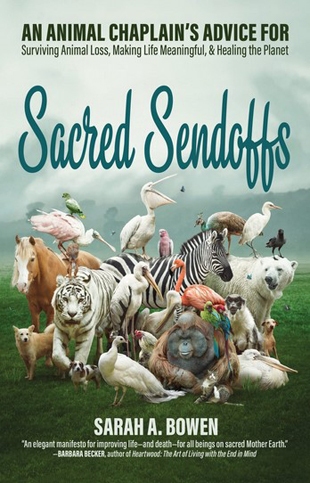Animal chaplain and Spirituality & Health magazine columnist Sarah Bowen wants us to realize our responsibility to the other creatures who share this planet. “It can seem overwhelming to decide where to even start,” she admits. But she offers clear and practical options.
Her book begins with the part that will appeal to the broadest audience: taking grief seriously when our pets die and learning how to manage grief at the loss of animal companions. Bowen combines data analysis, personal reflection, and practicality — as when she begins to advise on accepting the reality of a loss: “Grab some tissues, paper, and a pen. Find a safe, cozy place where you can be exactly as you are, without feeling the need to appear okay for others …”
After this, Bowen wants us to recognize creatures in the wild that die, why they do, and the importance to humankind to honor their passing. This is innovative, to say the least, in book form, but again she offers real examples of where and how it is already happening.
Chapter 10, “Farmed and Corporate Animals,” takes a similar approach to animals held in both benign and inhumane captivities, headed to the dinner tables of human beings when they are slaughtered. Agribusiness, fertilizers, and the use of hormones are lamented, and for excellent reasons. She offers ways to remember these “invisible animals” too in our lives.
We especially appreciated the author’s sensitivity to “Expanding Creaturely Compassion” (ch. 7), where she explains growing up as a Christian pastor’s kid, hearing “The Golden Rule” and wondering: “What would Jesus do about injured animals on the road? The answer seemed clear to me: If someone was hurt by the side of the road, then Jesus would want me to help them — even if they were a flattened frog.”
She then, appropriately, locates the golden rule in every religious and spiritual tradition, with varying language, and emphasizes that animals should do unto each other as they would like done unto them. There’s evidence throughout the animal kingdom of golden rule living. “Helping behavior has been seen in dolphins, gulls, apes, bats, and bonobos, among others. Interestingly, animals imprisoned in human systems comfort or assist each other, too.” Humans should do likewise.
By book’s end, eight common illusions are debunked. (1) I am not an animal. (2) Only humans have spiritual lives. (3) Wildlife loss is natural and unavoidable. (4) I can trust that my country has laws that protect the welfare of animals. (5) The food I buy is created humanely and sustainably. (6) People who disagree with me are my enemies. (7) We live on Earth. (8) Change is hard.
Only that seventh one is unclear on the face of it; as Bowen explains, “To break this illusion is to acknowledge that we are Earth.”
